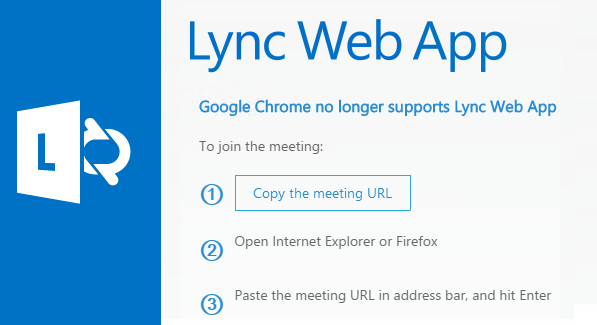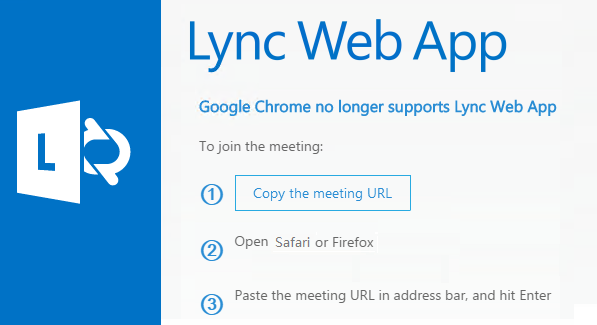Symptoms
This issue occurs after you apply the December 2014 cumulative update for Microsoft Lync Server 2013 web components server. When Google Chrome is your default browser, and you try to connect to a Lync meeting by using Lync Web App, one of the following user interfaces appears on your Windows-based or Mac-based computer.Windows
-
In this situation, a native Lync client in Windows is Lync 2013 or Lync 2010.
-
The native Lync client in Mac OS is Lync for Mac 2011.
Resolution
For Windows users
On December 31, 2014, Microsoft released an update for Lync Server 2013 (Cumulative Update 5.0.8308.866) to remove the manual workaround instructions for 32-bit versions of Chrome. The instructions were included in the previous December 2014 update (Cumulative Update 5.0.8308.857). This latest update enables Lync Web App to run in a 32-bit version of Chrome as usual. To avoid the manual workaround, administrators must apply the latest December 31, 2014 update. Microsoft has also begun to apply this update to Lync Online.
For Mac users
Google discontinued support for 32-bit versions of Chrome in Mac in November 2014. As Lync Web App works only in 32-bit versions of Chrome, to join a Lync meeting, Mac users must use either Safari or Firefox. When users who set Chrome as the default browser join a Lync meeting, they will see a message that instructs them to copy the Lync meeting URL, open Safari or Firefox, and then paste the meeting URL into a new browser window to start the Lync meeting.
More Information
Google changes on the Chrome browser affect the usage of Lync Web App in both Mac and Windows. This requires us to change Lync Server and Lync Online in order to deliver a seamless experience for Chrome users. Microsoft is already working on changes to improve the Lync Web App user experience and is expected to release another update in the first quarter of 2015. In the meantime, users will be provided with manual workaround instructions as part of the meeting join experience.Microsoft plans to remove this manual workaround, add support for 64-bit versions of Chrome in Mac, and continue to improve the Lync Web App experience for all Chrome users in early 2015. We are also working on making it possible for Chrome users to enjoy a full Lync meeting experience even after the planned deprecation of the so-called "Netscape Plug-In API," or NPAPI, that is going to be targeted by Google in April, 2015.
The third-party products that this article discusses are manufactured by companies that are independent of Microsoft. Microsoft makes no warranty, implied or otherwise, about the performance or reliability of these products.
Microsoft provides third-party contact information to help you find technical support. This contact information may change without notice. Microsoft does not guarantee the accuracy of this third-party contact information.












